Philip Goff is a professional philosopher, not a political journalist, politician or activist. So the argument in this essay is that Goff — as a philosopher — is attempting to create a philosophy (in this case, cosmopsychism) that somehow embodies and expresses his prior religious, political and ethical views. Similarly, the self-described “Christian theologian” Joanna Leidenhag (whose views Goff discusses) is attempting to make panpsychism embody and express her prior Christianity… as well as her political views.
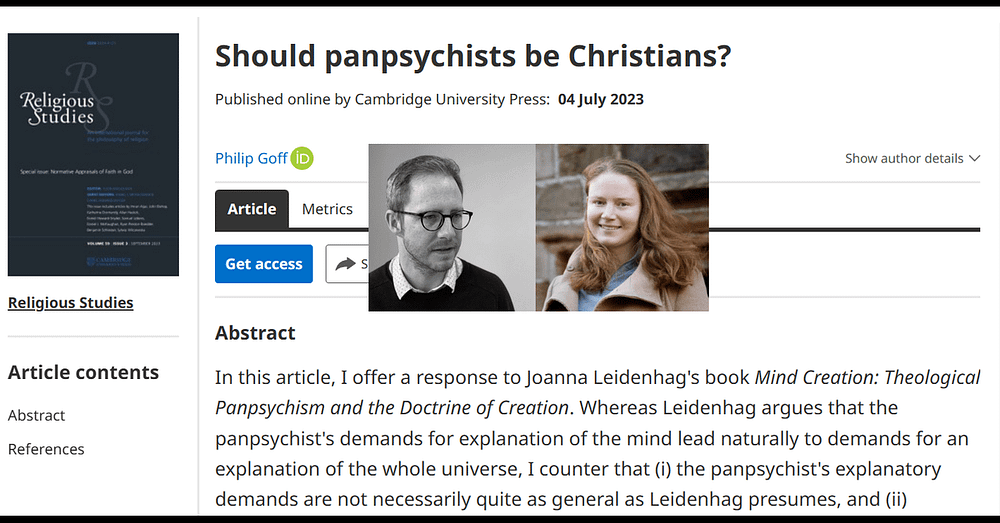
Much of this essay focuses on how the philosopher Philip Goff and Christian theologian Joanna Leidenhag tie (or even fuse) their panpsychism to their political and religious views. Relevantly, how they do so is very clearly shown in Goff’s paper ‘Should panpsychists be Christians?’, which was published in the journal Religious Studies.
There is a technical (as it were) middle section in Goff’s paper, which tackles issues which date back to the ontological argument. I shall ignore this section. Instead, I’ll simply tackle what is original (or peculiar) to Goff himself. [See note 1.]
Philip Goff’s Political and Religious Views
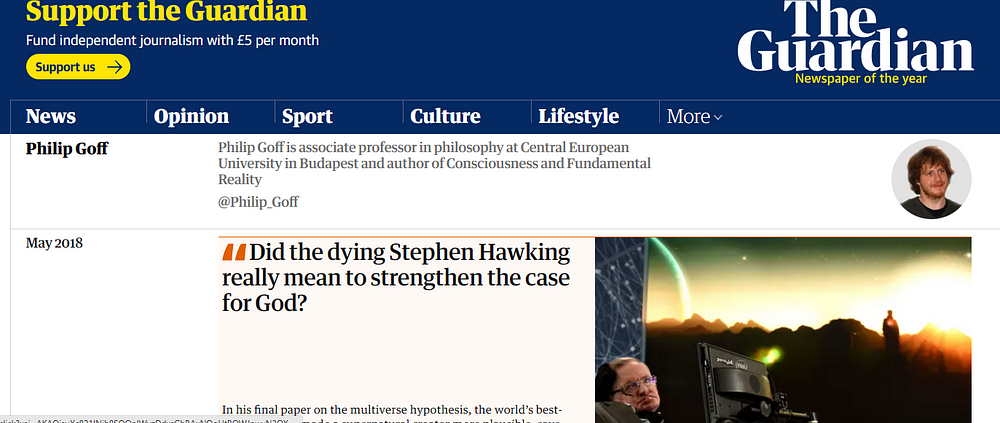
It’s worth saying straight away that readers can (or may) agree with some — or even most — of Goff’s political views and positions. However, the problem here is the artificial — and even dishonest — way these political views and positions are tied to (or even fused with!) two metaphysical positions — i.e., panpsychism and cosmopsychism.
For one, it’s surely possible to be a panpsychist and not hold any of Goff’s political values and views.
On the other hand, people can share Goff’s political values, views and ideas, yet also believe that panpsychism is baloney. (Goff may well argue otherwise.) Indeed, I suspect that most of those who do share Goff’s socialist politics (at least the ones who’ve given panpsychism any thought) do actually believe that panpsychism is baloney. What’s more, some of those people may even believe that a belief in panpsychism is politically counterproductive… or worse.
So what of Goff’s religious views?
The following is an anecdote that Philip Goff has told a couple of times in his books and publications:
“I once asked Chalmers if he had any religious sentiments, to which he replied, ‘Only that the universe is cool.’"
It’s crystal clear that Goff himself has “religious sentiments”…
However, Goff does have problems with what he refers to as the “Omni-God”. [see here.] He also has problems with what he calls “Abrahamic faiths”.
So why isn’t Goff a Christian?
Perhaps the main reason why Goff rejects Christianity is expressed in his own words here:
“[T]here are still profound challenges for Christians hoping to circumnavigate the problem of evil [].”
Goff also states the following:
“I personally think evil and suffering constitutes very strong evidence against the Omni-God hypothesis, and hence very strong evidence against any conception of Christianity that involves an Omni-God.”
In his books and elsewhere, Goff has offered his readers various autobiographical details which strongly suggest that his prior politics and ethics are calling the shots when it comes to his metaphysics.
Here’s an example of this as it relates to Goff’s just-stated position on God and evil:
“[T]o take the objection of my dad — a lifelong agnostic Catholic — to Christianity. [] Why didn’t Jesus stick around? If satisfactory answers to these questions cannot be given, then we haven’t avoided the problem of evil at all.”
One response here may be to argue that this autobiographical stuff is simply showing us why Goff isn’t a “traditional Christian”, not why he’s a panpsychist. However, since Goff himself ties (or fuses!) religion, politics and philosophy together, it will be shown why this autobiographical passage has been quoted.
There are, of course, other political and ethical reasons as to why Goff rejects Christianity. Yet those other reasons don’t seem to be primarily philosophical, logical and/or scientific either.
In any case, Goff himself tells us that he’s “spiritual”.
Perhaps it can be assumed that most panpsychists are panpsychists for primarily spiritual and/or political reasons too. Goff writes:
“[T]here are those such as Hedda Hassel Mørch, Itay Shani, and myself, who do have certain convictions which may be called ‘spiritual,’ or at least which depart more radically from our standard naturalistic picture of reality than bogstandard panpsychism.”
There is a split, however, which Goff himself notes. That split is between spiritual-but-not-religious panpsychists, and (traditionally) religious panpsychists.
Goff, Mørch, Itay Shani, etc. are (as it were) spiritual panpsychists, and Joanna Leidenhag is a Christian panpsychist. (Note that Bernard Kastrup, Deepak Chopra, etc. are spiritual idealists.)
Joanna Leidenhag and Philip Goff
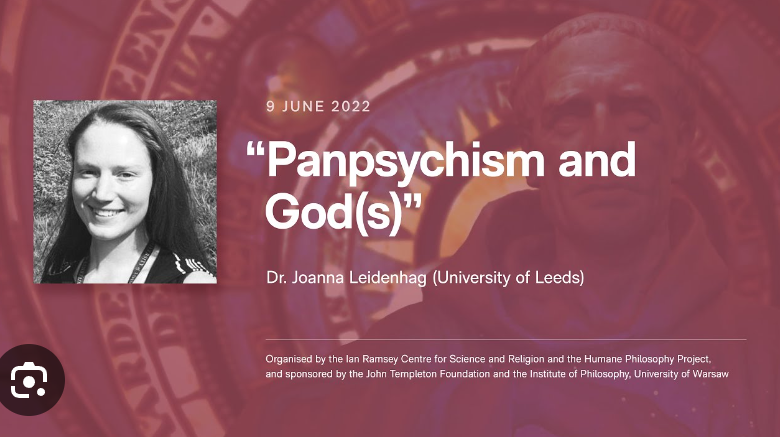
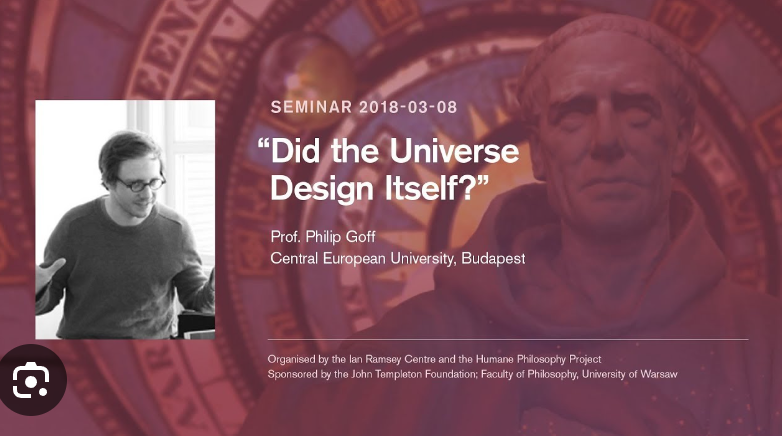
Philip Goff introduces Joanna Leidenhag’s book (Mind Creation: Theological Panpsychism and the Doctrine of Creation) by firstly telling us that “there has not been much work connecting up panpsychism with the Abrahamic faiths”…
And that connection is precisely what Leidenhag is attempting to bring about.
Goff continues:
“Leidenhag argues a partnership between panpsychism and Christianity is mutually beneficial for both parties, and outlines a number of ways in which one can be seen to benefit the other.”
So, to Leidenhag, the relationship between Christianity and panpsychism is reciprocal.
Goff also writes:
“Leidenhag also thinks panpsychist eco-philosophy can benefit from Christianity.”
This is an explicit acknowledgement that panpsychism is directly tied to politics. More accurately, both Leidenhag and Goff tie panpsychism to “eco-philosophy”. [See also ‘Ecosophy’.]
So Leidenhag is very much like Goff in that she’s attempting to make a metaphysical position serve religious, political and ethical goals and causes.
“Leidenhag’s aspires to use panpsychism to construct a conception of Christianity suited for a time of ecological crisis.”
This is exactly what Goff is doing with panpsychism.
In terms of detail.
In the following passage, Leidenhag ties what she calls “the divine mind” to a panpsychist position:
“This metaphysical intimacy between the divine mind and the natural world is easier to make sense of if both are — or are made up of — conscious entities.”
Indeed, even Leidenhag herself (as quoted by Goff) believes that Christianity
“‘is the most anthropocentric religion the world has ever seen’, given ‘man’s effective monopoly on spirit in this world’ in a standard Christian ontology”.
Goff himself can’t square (traditional) Christianity with his own political and ethical views. However, he can square it with his new (as it were) cosmic religion.
The Politico-Religious Use of Panpsychism
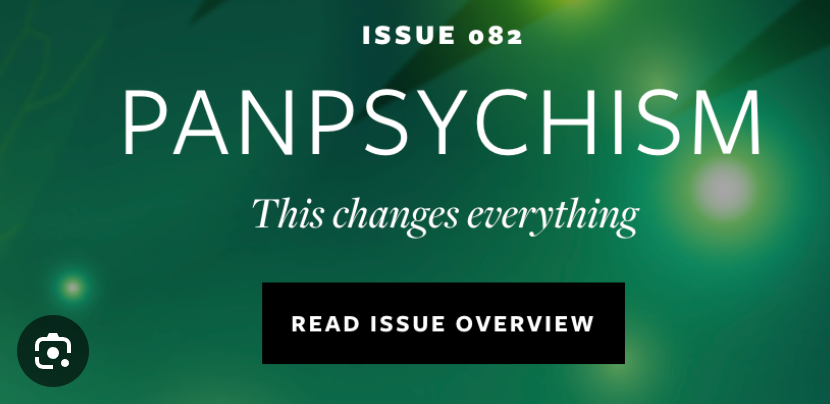
The way Philip Goff describes Joanna Leidenhag’s position makes it seem as she too is pragmatically using panpsychism.
For example, Goff writes:
“Leidenhag proposes ways in which adopting panpsychism can be beneficial for Christians."
Indeed.
Leidenhag believes that panpsychism can be “beneficial for Christians”.
So how does Leidenhag want to use panpsychism in beneficial ways?
According to Goff, Leidenhag uses panpsychism to advance Christianity by offering this argument:
“[I]f all of the natural world is conscious, suggests Leidenhag, then God can reside within it through the presence of the Holy Spirit within each conscious entity.”
Goff then tells us why Leidenhag (just like himself) doesn’t like what she sees as being the only alternative:
“[I]f panpsychism is false, [then] the universe at large is a kind of unfeeling mechanism.”
To Leidenhag (if not Goff), this would result in a situation in which
“it’s perhaps a bit hard to make sense of the Holy Spirit residing within a mechanism”.
This means that most of the above isn’t really about whether the Universe is actually “unfeeling” or feeling: it’s about what is beneficial to believe.
In Goff’s case, it’s mainly about what’s beneficial to his prior political and ethical views. In Leidenhag’s case, it’s mainly about what’s beneficial to her prior Christianity… as well as her politics.
Leidenhag also tells us (as Goff himself often does) that panpsychism
“is a conception of reality more constant with spiritual convictions, including but not limited to Christianity”.
And, yet again, Leidenhag comes clean about her belief that panpsychism can be beneficial to her own Christianity. (The phrase “comes clean” may seem rhetorical. Yet I can’t think of a more accurate way of describing Leidenhag’s own words.) According to Goff:
“By instead adopting panpsychism, we can return to the Christianity of St. Francis of Assisi, in which all things animate and inanimate have intrinsic worth.”
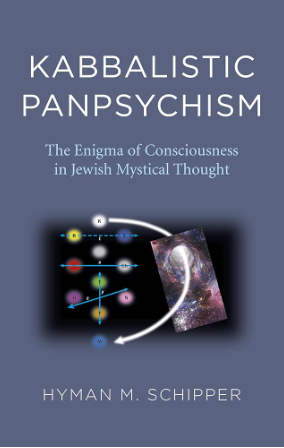
But what of Goff himself?
Leidenhag’s word “beneficial” has just been quoted a couple of times, and Goff also says that
“I agree on the benefit of panpsychism to eco-philosophy, and have in the past made similar arguments”.
Goff’s political and ethical position is made explicit when he continues with these words:
“The terrible mass destruction of forests we witnessed in Brazil in recent years under Bolsonaro, have a different moral character if we see them as the burning of conscious organisms.”
Thus, Goff comes very close indeed to admitting that his use of scientific (or physical) cosmology and theoretical physics (along with panpsychism itself) is simply a tool to advance his politics, ethics and religion.
In other words, Goff is a professional philosopher, not a political journalist, politician or activist. Thus, as a philosopher, he wants to create a philosophy that embodies and expresses his prior politics and ethics.
For example, Goff tells us that
“it would be nice if reality as a whole was unified in a common purpose”.
Goff also believes that what “would be nice” needs to be backed up with some science and some philosophy — otherwise his views may simply come across as being an expression of mere politico-religious sentiment. Thus, Goff continues by saying that
“certain features of reality, such as cosmological fine-tuning and psycho-physical harmony, give us grounds for taking that idea seriously”.
It can be seen that Goff has kept on updating his panpsychism in response to the recent science he’s just read. That may seem like a good thing in that he’s at least taking note of new science. Indeed, it may also seem as if he’s updating his philosophical positions in response to the new science.
However, Goff may simply see such new science as being (to use that word again) beneficial to his prior panpsychism, just as his panpsychism is beneficial to his prior politics.
To justify these claims.
When Goff first discussed panpsychism in his early papers (they date back to 2006), there was very little (if any) science to be found within them. There certainly wasn’t much — or even anything — about physical cosmology and scientific cosmology. This was the case up until around 2017, when Goff started to refer to “cosmopsychism”. Sure, Goff had previously referred to atoms, electrons, etc. in his early papers. However, he did so simply to argue that such things might (or do?) instantiate experience or consciousness.
Then Goff moved on to include spacetime itself within his panpsychism. (Goff wrote: “Spacetime on its own is a simple and ubiquitous experience[].”)
And now, in 2023, Goff states that the “quantum vacuum” may be conscious. Goff tells us that
“it seems to me that the self-explainer might just be the (conscious) universe itself, or perhaps the (conscious) quantum vacuum”.
So it has been argued that Goff has created a philosophy (i.e., panpsychism) that — somehow! - metaphysically embodied and expressed his prior politics and ethics. Similarly, Goff uses recent science to back up both his prior panpsychism and his new cosmopsychism, which is itself (at least in large part) the metaphysical expression of his prior politics and ethics.
Yet Goff seems to present the argumentative (as it were) arrow in reverse.
In other words, Goff hints that he discovered (i.e., through studying science) that the Universe has a “purpose”. Or in his own words:
“[A]s I argue in my book Why? The Purpose of the Universe, certain features of reality, such as cosmological fine-tuning and psycho-physical harmony, give us grounds for taking that idea seriously.”
And this, eventually, led to the idea that
“the other has equal worth to yourself is to overcome individualism and ego”.
Apart from this link being fantastically circuitous or tangential (admittedly, I’ve expressed it simply here), it can also be strongly suggested that Goff has inverted this argumentative arrow.
In other words, Goff makes it seem (or he simply hints) that he did his research in physical cosmology and (theoretical) physics, and only then did he come to his conclusion about “the other has equal worth to yourself”. Yet, in actual fact, Goff believed this long before his recent research into scientific/physical cosmology and theoretical physics.
Thus, as a socialist dating back to his teens (according to autobiographical details), Goff believed that that the other has equal worth (arguably, this isn’t necessarily a socialist belief at all). And then, many years later, he began to see if he could justify that belief in metaphysical terms. What’s more, he also came to argue (sometime later still) the equal-worth thesis in scientific and cosmological terms.
So all this is beginning to seem as if Goff is attempting to construct a new religion. Or, at the very least, he’s attempting to construct a complete worldview.
And that at least partly explains why the link between all the science Goff mentions and his just-stated political/ethical belief is just so fantastically tangential and circuitous.
Conclusion
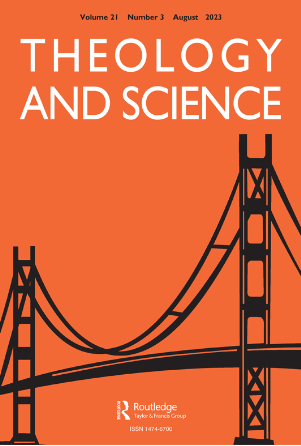
As can be seen, Philip Goff’s and Joanna Leidenhag’s politics and ethics are made explicit by… Goff and Leidenhag themselves.
And that explicit (although sometimes not so explicit) politics/ethics is also tied to (or embodied within) a new ontology — cosmopsychism.
As for religion and God.
Goff keeps on telling us (as does the physicist Paul Davies — see here) that he rejects “the God Hypothesis”…
Except that he doesn’t.
That’s because much of what he says about “cosmic purpose” is more or less (although sometimes precisely!) how many “eastern” and ancient religions have previously described God! [See here.]
All this means that Goff doesn’t, in fact, move away from either God or from religion. He simply moves away from traditional Western religions, and away from the Abrahamic God.
Note:
(1) This middle section (with the title ‘The Self-Explainer Argument’) is philosophically detailed. It’s all about Leibniz’s “Principle of Sufficient Reason”, “emergence”, “fundamental entities”, “self-explaining explainers”, “brute facts”, “seemings”, etc. Indeed, it even includes numbered arguments in the traditional academic-analytic-philosophy style. (The other sections in Goff’s paper are called ‘Does Panpsychism lead to God’, ‘Should Christians be Panpsychists?’ and ‘Panpsychism, Christianity, and Ecology’.)
Yet this technical digression in the middle of Goff’s ‘Should panpsychists be Christians?’ sticks out like a sore thumb. It also comes close to being irrelevant to the political and ethical views Goff wants to advance. (At least parts of it seem irrelevant.) It’s as if Goff is attempting to prove to his readers that he can still do technical analytic philosophy, despite his new found interest in creating a politico-religious philosophy — or even a politico-religious worldview.
Another problem with this technical middle section is that it doesn’t contain anything original to Goff. Indeed, he tackles themes which have been debated in analytic philosophy many times over the last few decades. What’s more, debates about self-explaining explainers (without, of course, that precise term always being used), etc. date back to the Ontological argument in the 11th century (or even further back than that).
More relevantly, nothing in this technical section is directly tied (or even can be directly tied) to Goff’s new cosmic religion or to his politics.
(*) See my ‘Why? The Philosopher Philip Goff’s New Cosmic Religion’.
(**) Other related links: ‘Panpsychist Philip Goff’s Combination Problem: Little Conscious Subjects and Emergence’, ‘Intrinsic Nature: Philosopher Philip Goff on What Physics Leaves Out’, and ‘Professor Philip Goff’s (Panpsychist) Philosophy of Trees’.
(***) In my last essay I noted the strong similarities between the physicist Paul Davies’s views and Philip Goff’s own. See: ‘Physicist Paul Davies’s Deep — or Specious! — Questions About Life, the Universe and Everything’, and ‘Physicist Paul Davies’s Contributions to the Advancement of Religion, As Seen By Father Mariano Artigas’.










No comments:
Post a Comment